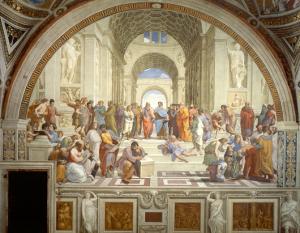 There is a horrible idea regarding “critical race theory.” This bad idea has nothing to do with the merits or demerits of critical race theory. What is that bad, no good, very terrible idea?
There is a horrible idea regarding “critical race theory.” This bad idea has nothing to do with the merits or demerits of critical race theory. What is that bad, no good, very terrible idea?
We should not criticize an idea nobody holds. We should not spike the football in a baseball game.
Our description of “critical race theory”should be what the person holding “critical race theory” affirms or believes. If not, then our criticism is attacking something, but not “critical race theory” as held by critical race theorists.
How could that happen?
On Schools of Thought and Verbal Confusion
“I greatly admire this about your religion,” he said and proceeded to outline what he thought I believed. Sadly for our apparent agreement, when I told him I was “Orthodox,” he assumed (given his background) that I meant an Orthodox Jewish person. I meant “Orthodox Christian” or “Eastern Orthodox” or “Greek Orthodox of Antioch.” For a moment I was confused and if this mutual confusion had continued, then the conversation would have been utterly pointless.
More serious: I once was in a faculty meeting where a philosopher was discussing a “post-modern” idea carefully and with nuance. The artists in the room were (briefly) confused as the use of “post-modern” in art in totally different than in philosophy. For a few minutes the conversation was becoming heated as both people felt misunderstood until, good scholars that they were, they had a laugh and clarified their use of terms. This was a near thing.
Imagine “owning the conservatives” only to find no serious conservatives affirms what you claimed. Someone is owned, but self-owning is too easy a win to celebrate.
One reason I wrote When Athens Met Jerusalem is that I kept meeting people from all sorts of political and theological backgrounds who attributed certain ideas to Plato that Plato almost surely did not hold himself. There were schools of thought (say Neo-Platonism) that held those ideas, but not Plato. This meant that there were forms of Platonism held by a goodly number of scholars that were not subject to the criticisms being made about “Platonism.” A writer, particularly if relying on secondary sources, might discard all forms of Platonism when she need not do so.
This is serious: thoughtful Christians like CS Lewis or JRR Tolkien were Platonists and this misunderstanding has caused many Christians to reject good things they had to say.
A complicated set of ideas may define terms in special ways. This is not “jargon” in the bad sense, but specialized vocabulary to give clarity to people discussing an idea. This is like a medical doctor developing acronyms or terms to provide for specific information. You have to get inside a big set of ideas to see how terms are used in that community. If the community cannot understand your criticism, you may be using the vocabulary badly!
On Complicated Schools of Thought and Affirming Criticizing Ideas
When asked to speak as a philosopher in apologetics, I often was asked about “post-modernism.” I advised we not focus on the complicated set of ideas called “post-modernism,” because the post-modernists I read often could not agree on a definition of “post-modernism” themselves. To the extent they did agree, they seemed to advance a mixed set of ideas. Some were interesting and might help see texts in new ways. Some of those ideas, from particular thinkers, were not good.
I had no problem arguing against bad ideas, but I wanted to make sure that I understood the idea as the proponent understood it. It is easy to win an argument against an idea nobody actually holds, because it is obviously stupid. This does not seem valuable, even if it sells books by ginning up fear. Ideas within Soviet style Marxism regarding religion were very bad ideas that were killing people during much of my career. Arguing against those seemed more useful. When Soviet style tyranny fell, I was happy and did not feel an immediate need to find a new intellectual foil.
We retained the temptations of the world, the flesh, and devils. The perennial desires to materialism, self-indulgence, and idolatry give an apologist unending work in himself. This may not be exciting, but has the merit of being recognizable. If someone says: “Greed is good.”
No.
Easy enough to argue forcefully against ideas people held, people I knew, without giving them a label that did not fit. This might sound picky, but getting other people’s deeply held beliefs wrong is uncharitable. Christians are right to be offended when critics argue against a parody or gross oversimplification of our views. This does not mean never “drawing lines” or making counter-arguments (even strong ones).
Instead, we should draw lines that define a position that matters: one that someone holds.
A problem at the moment is that many critics of “critical race theory” are not criticizing ideas people who affirm critical race theory hold. This is a very low bar that critics should be able to get over! Don’t examine Orthodoxy, or post-modernism, Platonism, or critical race theory, in a way that misses the point of those you are trying to persuade!
When I say, “I am a Platonist,” and a critic says, “You must hate the body,” then the criticism does not land. Christian Platonism (think CS Lewis) affirms the goodness of the body. Maybe I should not be a Platonist in the way I am (my Thomist or nominalist friends say “Amen”), but at least attack my actual views!
Similarly, when my social media feed contains Christians who affirm “critical race theory” and do not affirm what is claimed they believe, then critics have missed the mark. There are ideas or methodologies that seem (at first glance) to be very bad to me, I would have to examine them closely, but I do not need the label “critical race theory” to describe those individual ideas as bad. I begin with what a person believes, try to understand it charitably, and only if I must advance a criticism.
For example, one need not be a “critical race theorist” to think systematic racism exists. That is a not a telltale of some new bad idea. How do we know? Everyone agrees that Woodrow Wilson and the Progressive Movement worked hard to institutionalize the racism of the period. Some secular scientists and some religious figures of the time agreed that “white supremacy” was true and they built protections for white power. Dismantling such structures was easy at first, the obvious parts, but are harder later as one gets to more subtle legal biases. One can be a traditional conservative or a traditional liberal or many other political positions and affirm these facts.
We can, and should, think about how best to go about this godly work. What is the best way? Are some ways harmful?
These are all discussions that we must have without creating parodies of other views than our own. What good is that?
Three Signs of a Good Faith Criticism or On “On Critical Race Theory”
Again: I am not suggesting that criticizing ideas is wrong or that we must always be mealy mouthed.
Here is an example of a forceful take: intentional or lazy misrepresentation of someone’s ideas is a horrible idea. It is uncharitable and stupid!
Disagreeing is not hard. Find what someone thinks and summarize. Ask if they agree with the summary. Take account of their clarifications. If you still disagree, then make a sound and persuasive argument against that position.
Here are three signs of a good faith criticism:
- You have fairly described the view. (People agree that you disagree with what they believe!)
- You never confuse an “end” with a “means.” (People may have a goal that is good, but a means to get there that is bad. Keep them apart.)
- You begin with primary literature of the movement and never focus only on critics especially when those critics do not use primary literature.
Ask the person whose idea you think might be bad what you should read. Read those works. Dialog with the literature and those who understand that literature. If you then disagree, especially if the idea seems very bad, then have at it!
This is not quick. This implies that not every person will be able to opine, write, or be an expert on all big ideas! We have to build academic communities.
Not doing so is a horrible idea.












